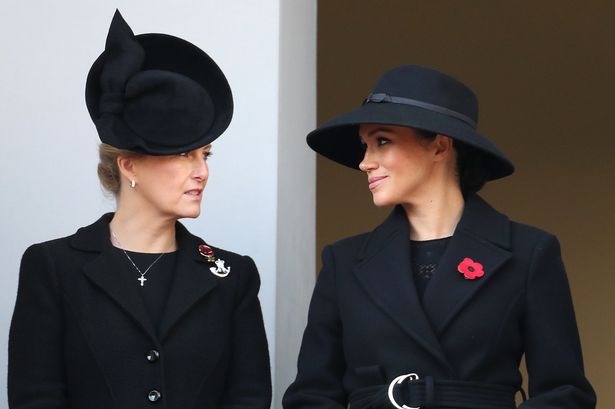The fairytale romance between Prince Harry and Meghan Markle, culminating in their grand wedding at Windsor Castle, captured global attention. Behind the scenes, however, the integration of a Hollywood actress into the complex and tradition-laden world of the British Royal Family presented its own set of challenges. Recognizing the potential difficulties, Queen Elizabeth II, a seasoned monarch with decades of experience navigating royal life, reportedly sought to ease Meghan’s transition by assigning a mentor – Sophie, the Countess of Wessex, later the Duchess of Edinburgh. Sophie, married to the Queen’s youngest son, Prince Edward, was seen as a suitable guide, having herself undergone a period of adjustment after entering the royal fold. She was known for her discretion, her dedication to royal duties, and her close relationship with the Queen. The hope was that Sophie’s experience and gentle guidance would help Meghan navigate the intricacies of royal protocol, public life, and the often-unwritten rules of the institution.
The plan, however, seemingly faltered. While the exact reasons for its reported lack of success remain shrouded in speculation and the inevitable veil of royal privacy, various factors likely contributed. The differences in backgrounds between Meghan and Sophie were significant. Meghan, an American actress accustomed to the fast-paced, individualistic nature of Hollywood, faced a steep learning curve in adapting to the more reserved and hierarchical structure of the British monarchy. Sophie, on the other hand, had a background in public relations and a more gradual introduction to royal life, allowing her to adapt more seamlessly. Bridging this cultural and experiential gap may have proved more challenging than anticipated, even with the best of intentions. Moreover, the intense media scrutiny surrounding Meghan, often bordering on intrusive and at times fueled by prejudiced undertones, likely added an extra layer of complexity to the mentoring dynamic.
The media, eager for any hint of discord or drama within the royal family, may have inadvertently exacerbated the situation. Speculation and rumors about tensions between Meghan and other members of the royal family, including Sophie, became fodder for headlines. This constant media attention, often negative and sensationalized, created a challenging environment for any budding relationship to flourish. It’s plausible that this external pressure, coupled with the internal pressures of adapting to royal life, hindered the effectiveness of the intended mentorship. The unrelenting spotlight on Meghan’s every move, from her fashion choices to her interactions with the public, could have created a sense of self-consciousness and pressure that made it difficult to form genuine connections within the family.
Furthermore, the dynamics within the royal family itself are inherently complex. Navigating the various personalities, hierarchies, and unspoken rules can be a daunting task for any newcomer. Even with the Queen’s support and Sophie’s willingness to guide, Meghan faced the challenge of finding her own place within the established order. It is possible that differing opinions on how to approach royal duties, public engagements, or charitable work contributed to a divergence in perspectives between Meghan and Sophie, or indeed, other members of the family. The very public nature of royal life, where every action is scrutinized, leaves little room for private disagreements or the natural process of finding common ground.
It’s also important to acknowledge that mentoring relationships, even under ideal circumstances, are not always guaranteed to succeed. Personalities, communication styles, and individual needs play a significant role in determining the effectiveness of such relationships. It’s possible that despite the best intentions, Meghan and Sophie simply didn’t click as mentor and mentee. Their personalities or approaches to royal life might have been too different to foster the close bond that the Queen had envisioned. This isn’t necessarily a reflection on either individual, but rather a recognition that mentorship requires a certain degree of compatibility and mutual understanding. The absence of this crucial element might have contributed to the reported failure of the arrangement.
Ultimately, the details of what transpired between Meghan and Sophie remain largely private. What is clear is that the intended mentorship didn’t unfold as planned. The complexities of royal life, the intense media scrutiny, and the inherent challenges of adapting to a new and demanding environment likely played a role. While the Queen’s intentions were undoubtedly noble, the reality of integrating a modern, independent woman into a centuries-old institution proved more intricate than a simple mentorship could resolve. The unfolding events, culminating in Harry and Meghan’s departure from royal duties, underscored the significant challenges faced by those navigating the intersection of tradition, modernity, and the intense pressure of life within the royal spotlight.














